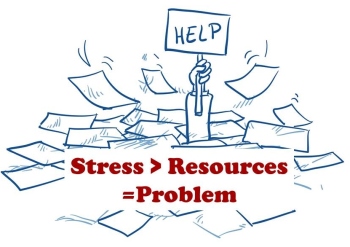Process or Outcome Thinking?
Posted on
 |
I love a good process, and I’ve spent a good chunk of my career developing them for various organisations. So it’s not surprising that I keep a problem-solving process mindset towards helping people to overcome disruptive stress. When it comes to resolving a stress, which do you think would have the biggest impact – thinking about how the stressful situation came about, or thinking about what’ll be like to have it resolved? If you’ve got something stressing you out which is potentially solve-able in the future (and which doesn’t put you into full fight-flight to think about), you might like to try this technique which was developed with a group of UCLA students. |
Take a few quiet moments – grab a brew if you like – to visualise how this problem situation came about. Remember the details of what happened as it first began. It might not be pleasant, but it’s not for long. Then take it step by step, visualising what happened, what was said, remembering how you felt. Take your time, seeing it as if you were watching a movie of it. If some details are a little hazy, it doesn’t have to be precisely accurate. And if the way you picture it in your mind’s eye isn’t movie-quality, that’s fine too. Allow yourself to experience curiosity about how you might resolve that stress. Spend five minutes each day for the next 5 days, repeating the reconstruction.
A second group of students was asked to do something similar, but visualising the outcome they’d like instead – what they’d see and hear, and how they’d feel as they emerged from the problem situation, putting it behind them.
Which did you think would be most effective? The first group fared much better when it came to actually resolving the situation, taking more advice and action, experiencing more of a mood boost, and reporting more learning from the stressful experience. Focusing on what you want may be more pleasant, but it gives your creative thinking no guidance on how to get there. Thinking about the stressful situation itself is more likely to lead to solutions.
Stress is complicated – it’s really an umbrella term for lots of different emotions, which all have something in common. Whether you’re feeling worried, anxious, depressed, frustrated or upset, every stress is some kind of gap between how you’d like things, and how they are.
|
The more gaps someone’s experiencing, or the bigger individual gaps are, the more likely that stress will outstrip their resources for dealing with it, becoming a problem. But not all stress is bad - our national survey revealed that 34% of people enjoy the stress of their role. Useful stresses are the ones which make life interesting – the challenges we rise to. We often experience them as energising rather than draining, and sometimes even the ones we wouldn’t have chosen to experience can bring out our very best. |
 |
So how do you experience more of those useful stresses and fewer of the unpleasant ones? ‘The Problem Solvers’ Guide to Keeping Stress Useful’ is designed to get you started, and you can get it at http://www.resolve-stress.com/converter-guide-linked-in

Add a comment: